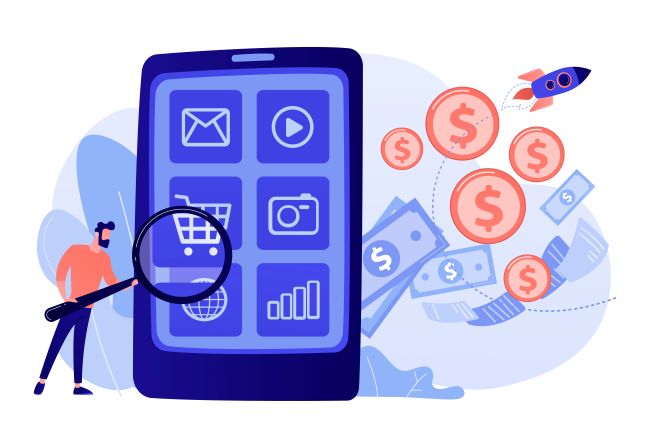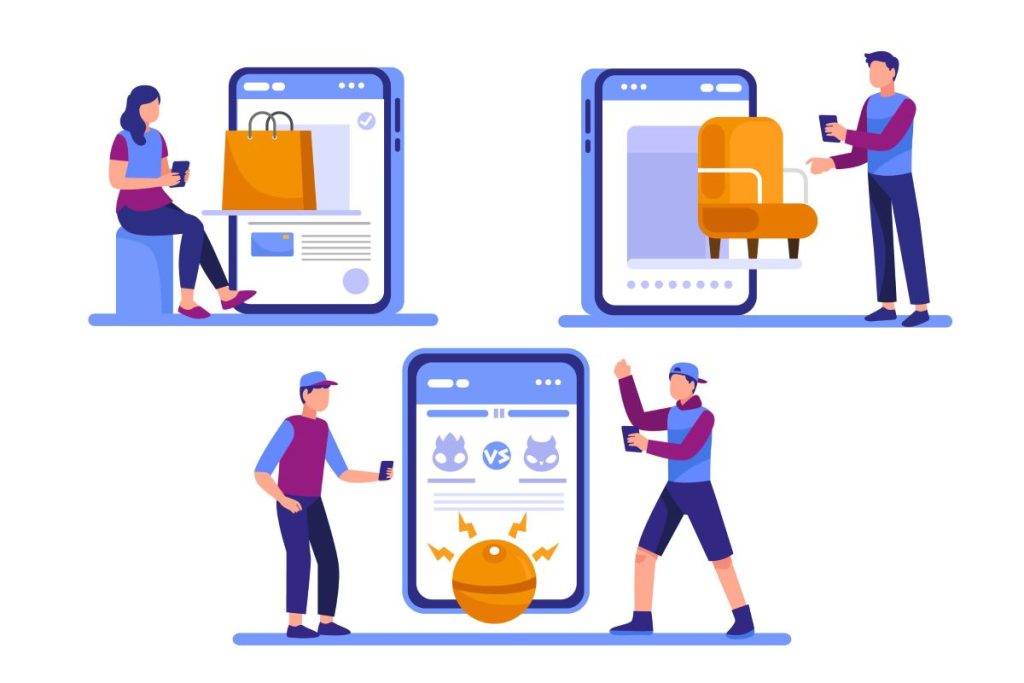Mobile applications have completely changed how we purchase online in the current digital era, when smartphones have assimilated into every aspect of our life. Ecommerce applications have become effective tools for expanding a company’s customer base, improving the customer experience, and ultimately increasing sales.Particularly when it comes to internet purchasing, our mobile devices play a significant role in our daily lives. This is even more accurate when shopping through a specific app: 85% of online consumers, according to Forbes, prefer native e-commerce applications to e-commerce websites.
Online retailers can increase their revenue by using a simple and highly functional ecommerce app. Additionally, that highly sought-after location on a customer’s home page and notifications screen may present extra marketing possibilities and foster brand loyalty.
The practise of establishing sales channels using social media, such as selling on Facebook or purchasing on Instagram, is known as social commerce and is distinct from ecommerce apps. While social commerce is an important and expanding trend, a “ecommerce app” is a specialised piece of software that is linked to a particular brand.
In this blog, we’ll examine what an ecommerce app is and how it can have a big impact on a company’s expansion of sales..
Learn more: How to make your First Ecommerce Sale
Table of Content
- What is an e-commerce app?
- What qualities does an e-commerce app have?
- Features that are optional for e-commerce apps
- Types of e-commerce apps
- How to Utilize Apps to Boost Sales
- The Power of Ecommerce Apps in Boosting Sales
- Benefits of creating an e-commerce app
What is an e-commerce app?
A piece of software known as a “ecommerce app” or “mobile commerce app” enables users to explore and buy products from online stores.
Apps for mobile commerce are advantageous for both customers and business owners. In a specialised place, brands can interact with consumers more effectively, and customers can customise and manage their experience. Also made easier by tools like Shopify and Ecwid by Lightspeed is the process of creating mobile apps.
The practise of establishing sales channels using social media, such as selling on Facebook or purchasing on Instagram, is known as social commerce and is distinct from ecommerce apps. While social commerce is an important and expanding trend, a “ecommerce app” is a specialised piece of software that is linked to a particular brand.
What qualities does an e-commerce app have?
While there are subtle differences between various ecommerce platforms in presentation and style, all mobile commerce apps have a few features that are both necessary and nifty.
Key characteristics of an e-commerce app
- Features for browsing and searching: An ecommerce app’s goal is to make locating things as simple as possible, whether it’s looking for a specific item or exploring the newest products.
- Carts for shopping: Every mobile commerce app must have a shopping cart where users can quickly add items, modify quantities, etc.
- Shopping trolleys: Every mobile commerce app must have a shopping cart so users can quickly add products, modify quantities, etc.
- Customer service: When making a purchase error, initiating a return, or exchanging an item, customers occasionally require assistance navigating an online retailer. When there is some kind of ecommerce customer care within their mobile app, that process is significantly simplified.

Features that are optional for e-commerce apps
Messages sent using push: Customers can be reminded about things they still have in their shopping carts, be informed when an item has been restocked, and more by turning on push notifications.
Multiple ways to pay: Multiple payment methods enable a simple and seamless checkout experience. Additionally, it gives customers more flexibility—they may select between using a credit card, PayPal, or possibly a buy now, pay later company like Affirm—to make their payment.cc
Learn more: 3 Strategies for Managing Wholesale Ecommerce on Shopify Plus
Types of e-commerce apps
There are two major sorts of mobile commerce apps when it comes to selling to consumers:
B2C (Business to Consumer) :
The majority of mobile ecommerce apps are currently B2C apps. They link consumers and businesses that provide goods and services. Apps for online retailers like Nordstrom and Amazon are a couple of examples.
C2C (Consumer to Consumer) :
Similar to this, C2C ecommerce apps link two or more customers so they can trade goods or services. Apps like eBay and Poshmark are two examples.
How to Utilize Apps to Boost Sales
E-commerce apps can be used in a variety of ways to increase sales. Here are some pointers:
- Offer unique discounts and promotions: Offering consumers special deals and promotions is one of the finest methods to entice them to download your app. Discounts, free shipping, or first access to new products could all be examples of this.
- Personalise the shopping experience: As was already noted, e-commerce apps can gather information on users’ purchasing patterns. The personalization of the purchasing experience made possible by this data has the potential to boost client happiness and sales. You may, for instance, offer the user tailored marketing messages or recommend things that they might find interesting.
- Use push notification: push notifications to inform users about new items, sales, and other promotions. Push notifications are a terrific method to do this. This may increase downloads of the app and revenue. To inform users of a new product that has recently been added to your store, for instance, or to inform them of a discount that is about to begin, you may send push notifications.
- Make checkout simple: Make sure that the checkout procedure is as simple as feasible. This entails utilising a payment processor that is commonly used as well as ensuring that the shipping procedure is easy to understand.
By following these tips, you can use e-commerce apps to boost sales and grow your business.
Learn more: Introducing Shopify; The best Ecommerce Platform Available
The Power of Ecommerce Apps in Boosting Sales
- Improved User Experience: Customers can enjoy a seamless and customised buying experience with e-commerce apps. Apps let consumers browse product catalogues with ease, make rapid purchases, and track their orders thanks to user-friendly interfaces and optimised design. An app’s speed and convenience help customers be more satisfied and make more repeat purchases.
- Push alerts and In-App Messaging: One of the key benefits of e-commerce apps is their capacity to provide users with push alerts and in-app communications. Businesses can use this function to send customised offers, discounts, new product announcements, and reminders. These communications can have a big impact on customers’ purchasing decisions and motivate them to buy.
- Personalization and recommendations: Ecommerce apps have the ability to gather and analyse user data, enabling firms to offer recommendations that are specifically tailored to a customer’s browsing and purchasing history. Apps may boost user engagement and boost sales by showing products that are extremely relevant to each user by customising product recommendations to individual interests.
- Simplified Checkout procedure: A lengthy and complicated checkout procedure is one of the biggest obstacles to finishing an online transaction. Ecommerce apps offer a quicker and simpler checkout procedure to address this problem. The purchasing procedure is quick, simple, and hassle-free thanks to features like saved payment information, one-click ordering, and secure mobile payment alternatives, which lower cart abandonment rates and increase sales.
- Integration with Mobile Wallets: As digital payment methods have become more prevalent, e-commerce apps may now interface with well-known mobile wallets like Apple Pay, Google Pay, and PayPal. The need to manually enter card information is removed, giving users a safe and practical option to make payments. Apps can enhance revenue by attracting a larger consumer base and by providing a variety of payment alternatives.
- Gamification and Loyalty Programmes: To engage and reward customers, e-commerce apps can include gamification components and loyalty programmes. Businesses can encourage repeat business by rewarding customers with points, discounts, or special access to deals and events. The gamification component provides a fun and competitive element, boosting user engagement and boosting revenue.
Benefits of creating an e-commerce app
Creating an ecommerce app is advantageous for both consumers and business owners, regardless of the type of ecommerce app that best suits your business strategy. This is how:
- Speed: Ecommerce apps are often faster and more user-friendly than mobile websites because they save their data locally on mobile devices. With a quick mobile app, users are less likely to abandon their carts and business owners are more likely to boost their income potential. Faster load times can also result in higher conversion rates and reduced bounce rates.
- Visibility: It’s a great win if your e-commerce app appears on your clients’ home screens. Additionally, online retailers may reach their customers wherever they are with the help of technologies like push notifications, even if they are interacting with a third party.
- Personalization: Customers may customise their shopping experiences with ecommerce applications, whether it’s through saving their sizes or adding their favourite things to a wishlist. In return, business managers can learn more about what their customers want and customise real-time communication to suit each individual’s tastes.
- Brand adherence: Ecommerce apps also give business owners the chance to increase brand loyalty and consumer retention. And that devotion is really valuable: App users are three times more likely to make a subsequent purchase, claims eMarketer. Additionally, they generate over three times as much income as average buyers.
Conclusion
Ecommerce apps have revolutionised how companies interact with customers and transact for goods and services. These apps provide improved user interfaces, tailored suggestions, streamlined checkout procedures, and connectivity with mobile wallets. Businesses may grow sales, foster client loyalty, and gain an advantage over rivals online by utilising the power of ecommerce apps.
Join us as you begin your Shopify journey
We are e-commerce specialists and Shopify Partners. Get in touch with us if you need assistance with Shopify, need a whole website built, or have any other general questions.

